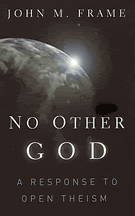- Thread starter
- #21
Drew said:If our working definition of "immutable" is
then there is no conceptual or logical problem with asserting that God is immutable on the one hand while also holding the view that God can change his mind on the other. If God created a world where he gives some "free will" to other agents (e.g. us), then He might indeed react to free will actions of people by changing his mind. His nature remains unchanged, but He reacts to things that He might not have foreknown (I find the Biblical case for God's exhaustive foreknowledge to be quite weak).
I think ascribing "immutability" to God is entirely consistent with also believing that He can change his mind - I am prepared to defend this position (which this post does not do in any depth). Since there is no "logical" or conceptual problem here, the person who believes that God is both immutable and never changes his mind has to make the case Biblically, rather than appeal to a non-existent logical contradiction between a God that is both immutable and never changes his mind.
What Drew suggests is a noval idea, it doesn't have roots in Biblical or historic Christianity, it's OPEN THEISM.
God is perfect, that includes His knowledge of all things. Drew is saying God is not perfect, He changes His mind, which means His knowledge and judgement are not perfect since changing His mind is always for better or worse. Drew's man made god can error. Open theists will change the meaning of immutable from it's historical use in the Church to fit his system. Immutable means "not subject or susceptible to change" and the Church has always understood this truth as speaking to God's nature, will, knowledge, etc. Webster's of 1829 reads "IMMUTABLE, invariable; unalterable; not capable or susceptible of change." AND "IMMU'TABLY, adv. Unchangeably; unalterably; invariably; in a manner that admits of no change." AND "IMMUTABIL'ITY, Unchangeableness; the quality that renders change or alteration impossible; invariableness. Immutability is an attribute of God."
Quote from bible.ca
1. God is everywhere (omnipresent): Mk 5:10; Jude 6; Rev 20:1-3; 1 Ki 8:27; 2 Chron 2:6; 6:18; Isa 66:1; Acts 7:49; 17:27-28; Ps 139:7-13
2. God is all knowing (omniscient): Ps 139:1-6; Job 42:2; Acts 2:23; 1 Tim 1:17
3. God is all powerful (omnipotent): Gen 17:1; 35:11; Rom 13:1; 1 Tim 6:15; Rev 19:6





